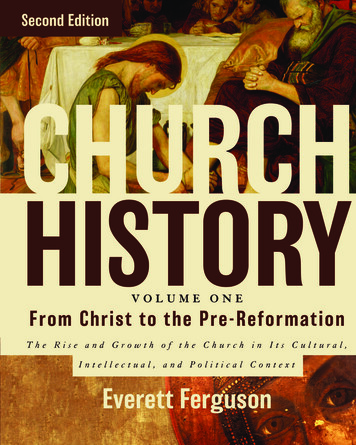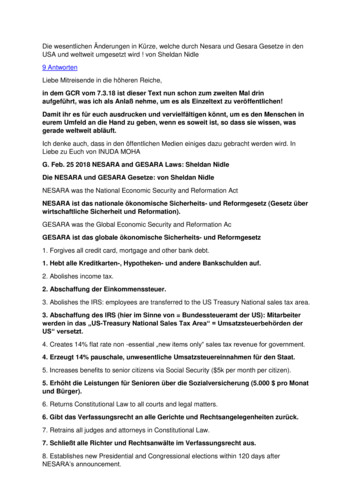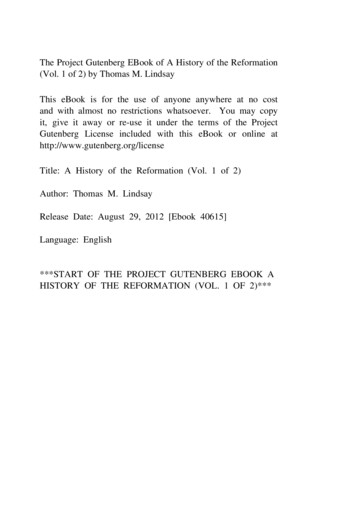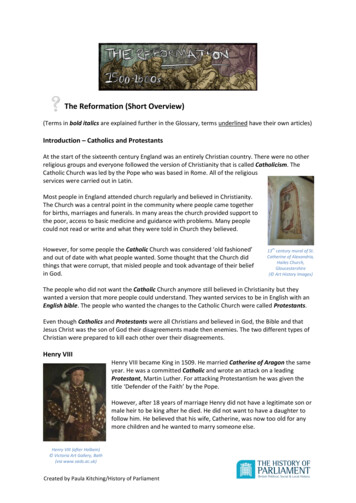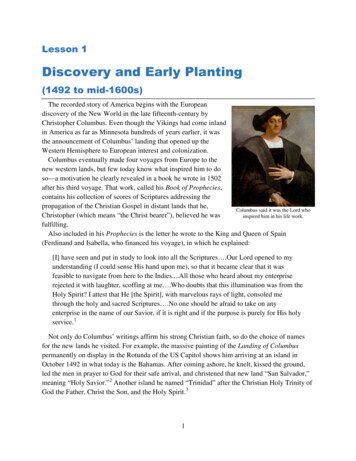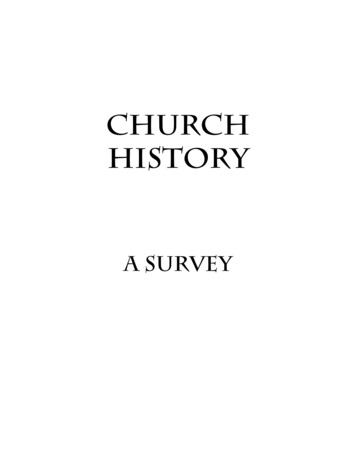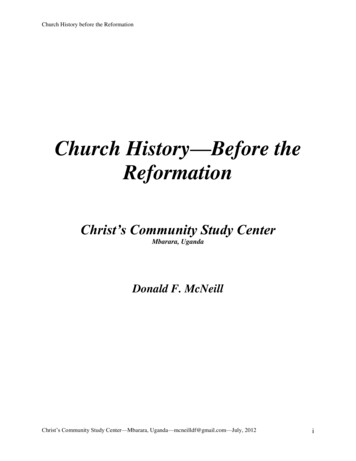
Transcription
Church History before the ReformationChurch History—Before theReformationChrist’s Community Study CenterMbarara, UgandaDonald F. McNeillChrist’s Community Study Center—Mbarara, Uganda—mcneilldf@gmail.com—July, 2012i
Church History before the ReformationOutline of Church History—Before the ReformationI. The Beginning of the Church of the New CovenantA. Relationship to JudaismB. The Spread of Christianity outward from JerusalemC. The Contribution of the Graeco-Roman World to the Spread of Christianity1. Political contributions from the Romans2. Intellectual Contributions from the GreeksD. The Contributions of the Jews to the Spread of ChristianityE. The Spread of Christianity throughout the Roman EmpireII. The Persecution of the ChurchA. Religious Persecution by the JewsB. Persecution by Roman EmperorsC. Persecution by the Roman PopulationIII. The ApologistsIV. The Apostolic FathersA. Clement of Rome (30-100)B. Ignatius (first to the early part of the second century)3. Polycarp (70-155)4. Other Writings of the Apostolic Fathers (Cairns, pp. 75-77)a. The Epistle of Barnabas (130)b. The Epistle to Diognetus (late second or early third century)c. The Second Epistle of Clement to the Corinthians (150)d. The Interpretations of the Sayings of the Lorde. The Shepherd of Hermas (150)f. The Didache (The Teaching of the Twelve Apostles)5. Summary Statement of the Writings of the Apostolic FathersV. Heresies within the Early ChurchA. Judaistic HeresiesB. Greek Heresies1. Gnosticism2. Manicheanism3. NeoplatonismC. Theological Heresies1. Marcionism2. Montanism3. Monarchianism4. DonatismVI. Constantine the Great and the Edict of MilanVII. The Later Church FathersA. AthanasiusB. AmbroseC. JeromeD. AugustineVIII. Monasticism: a Reaction to the “Official Theology” of the Churchunder ConstantineA. Solitary MonasticismChrist’s Community Study Center—Mbarara, Uganda—mcneilldf@gmail.com—July, 171818182020202022222323232626ii
Church History before the ReformationB. Communal Monasticism(1) Pachomius(2) BenedictC. The General Effect of Monasticism upon the ChurchIX. The Rise of the PapacyX. The Fall of the Western Roman EmpireXI. The Christianization of the BarbariansXII. Pope Gregory the Great and the Medieval ChurchXIII. Tension between the Western Popes and the Emperors of the Eastern EmpireXIV. Theological Controversies in the Eastern ChurchXV. The Church Faces IslamXVI. The Alliance between the Carolingian Rulers and the Western ChurchXVII. The Decline of Charlemagne’s Empire and the Birth of FeudalismA. The Decline of Charlemagne’s EmpireB. The Birth of FeudalismXVIII. The Dark Days of the PapacyXIX. Monastic Reform—the Cluny MonasteriesXX. Ecclesiastical Reform—the Papacies of Bruno and HildebrandXXI. The Continuation of the Investiture Controversy after Gregory’s DeathXXII. Lessons from Church HistoryXXIII. The Final Break between the Western Church and the Eastern ChurchXXIV. The “Holy” (?) CrusadesXXV. ScholasticismChrist’s Community Study Center—Mbarara, Uganda—mcneilldf@gmail.com—July, i
Church History before the ReformationChurch History—Before the ReformationI. The Beginning of the Church of the New CovenantA. Relationship to JudaismFor a long time after the death of Christ, the Christian church functioned as another sect ofJudaism, and by doing so, received the same protection of Roman law provided for the Jews.They continued to worship in the Temple as well as celebrate the Lord’s Supper and administerbaptism as the sign of the new covenant. They also still recognized the dietary restrictions of theMosaic Law and observed circumcision. Even after Peter’s revelation concerning Cornelius(Acts 11), it was apparently not clear to the Jewish Christians that Gentiles would have equalstanding with Jewish Christians making it unnecessary for Gentiles to “become Jews” beforebecoming Christians. Peter himself was a little “fuzzy” in his thinking on this issue until theApostle Paul made things clear to him and to everyone else in the first church council, theCouncil at Jerusalem in 49 AD (Acts 15; cf. Gal. 2: 11-14). In that council it was decided thatthe Jewish Christians would not place the yoke of the Mosaic Law upon the Gentile believerswhich even the Jews themselves had not been able to bear (Acts 15: 10).B. The Spread of Christianity outward from JerusalemJesus had given the apostles their “marching orders” before His ascension by telling them to beHis witnesses in Jerusalem, in Judea, in Samaria, and unto the remotest parts of the earth (Acts 1:8), but it took considerable time before they embraced the missionary vision of their Lord. Forsome time the Christian faith remained hemmed-in by Jerusalem and the traditions of Judaism,and not until the martyrdom of Stephen which instigated the persecution of Christians inJerusalem did the disciples of Christ (excluding the apostles) move outward to other areas ofJudea and Samaria taking the gospel with them (Acts 8: 1). We are informed in Acts 11: 19 thatthe Christian church of Syrian Antioch was planted at this time, not by one of the apostles, but byunnamed Christians fleeing the persecution in Jerusalem. Fleeing persecution, if possible, wasalso one of Jesus’ instructions to the twelve. If they were persecuted in one city, they should fleeto the next (Matt. 10: 23). If at all possible they were to stay alive in order to preach the gospelanother day and in another place; martyrdom was not to be sought for its own sake.Along with the persecution following Stephen’s martyrdom, another major contributor to theseverance (separation) of Christianity from Judaism and the resulting expansion of the churchwas the Jewish War with Rome from 66-70 AD, ending with the conquest of Jerusalem by Titusof Rome and the destruction of the Jewish temple. Jesus had warned His church that this wouldhappen (Matt. 24: 2; 15-21), and following His instructions, the Christians in Jerusalem fled toPella across the Jordan before Titus sacked the city. In this way, the church disassociated itselffrom Jewish nationalism and its rebellion against Rome. Having no temple, the Jews continuedto propagate Judaism in the time-honored institution of the synagogue established throughout theMediterranean world during the exile, but Jewish Christians were no longer welcome because oftheir retreat into Pella during the war. Little by little, God was distinguishing His church fromapostate Israel which had rejected His messiah, and He would use martyrdom and war toaccomplish this end. By AD 70, the Jewish church in Jerusalem had dwindled to a very smallnumber of believers, and the center of Christianity had moved from Jerusalem to Antioch, theWestminster Theologcial College and Seminary—dfm—September, 20071
Church History before the Reformationcapital of the Syrian Province of Rome (Pillay and Hofmeyr, Perspectives on Church History, p.3).It was in Antioch where believers first received the name “Christians”, a name of derision(ridicule) from pagan Antiochians. It was also in Antioch where some of the first Christiansbegan witnessing to the Greeks (Acts 11: 20). When the leaders in the Jerusalem church heard ofthe growth of the church in Antioch, they sent Barnabas to Antioch where he witnessed what theLord was doing. Needing help, he sought out Saul (who had been converted roughly 3 yearsearlier) in strengthening the believers in Antioch. For one year Saul (later called Paul) andBarnabas taught together in Antioch before they began their missionary journeys together (Acts11). Antioch thus became a strategic center for world missions as the first church sending outvoluntary missionaries—those who were not fleeing persecution! (Acts 13: 1) While Jerusalemwas the center of Christianity from 30 to 44 AD, Antioch became the center from 44 to 68 AD.The progressive shift from Jerusalem to Antioch is presented in the first twelve chapters of Acts(Cairns, pp. 55, 59).C. The Contribution of the Graeco-Roman World to the Spread of ChristianityCairns (Christianity Through the Centuries, pp. 35-36) has noted several contributions of theGreek and Roman cultures to the spread of the Christian faith. They are noted below.1. Political contributions from the Romansa. The Romans developed a unifying system of law and order as well as the concept of the unityof mankind under this legal system. This idea, in turn, contributed to the Biblical teaching of theuniversality of mankind under the law of God. Roman citizenship granted to non-Romanscontributed to the concept of citizenship in the kingdom of heaven granted to all men who werepreviously aliens to the covenants which God had made with His Jewish people (cf. Phil. 3: 20;Eph. 2: 12). Those who were born as Roman citizens, even Jews like Saul of Tarsus, wereafforded civil and judicial rights going far beyond those who had to purchase their citizenship.On his missionary journeys, Paul made liberal use of his status as a Jew who had been “born” aRoman citizen (Acts 22: 28; 16: 37; 25: 11).b. Free movement throughout the Roman Empire from the time of Augustus Caesar (27 BC toAD 14) made travel from one part of the empire to the other relatively safe. By the time ofChrist, no country dared challenge the might of the Roman legions (soldiers). This was knownas the Pax Romana (The Roman Peace), during which Rome ruled the world “from Armenia toSpain, from the Sahara Desert of North Africa to the river Rhine of present-day Germany”, anempire of some 50 million people of many nations and ethnic groups. The “barbarians” werethose people groups and nations which did not participate in the Graeco-Roman culture (Pillay,p. 5).c. An excellent system of roads, some in existence today, made travel possible from one strategiccity to the next. The Apostle Paul made liberal use of these roads on his missionary journeys.d. The Roman army drafted natives into military service, some of whom became Christians.When these soldiers were deployed to different parts of the Roman Empire, they took their faithwith them. Cairns believes that the Christian faith was introduced in Britain in this manner.Westminster Theologcial College and Seminary—dfm—September, 20072
Church History before the Reformatione. The Roman conquest of so many powerful city states led to the belief that the prevailingreligions and gods of these conquered peoples were inadequate. Furthermore, the emperor cultworship (the worship of the Roman emperor) did not satisfy the personal religious needs of thesepeople; it was merely a civic religion instituted by the emperor to provide civic and politicalstability throughout the empire. [Generally the Roman government was tolerant of all religionsprovided that their adherents would also worship the emperor. It was this emperor worshipwhich laid the foundation for the persecution and execution of so many Christians over asuccession of Roman emperors—Christians who could not, and would not say, “Caesar isLord”.] Thus, the conquered peoples of the empire were left in a spiritual vacuum whichprepared them for the introduction of the Christian faith. The greatest rival of the Christian faithat this time were the mystery religions of Cybele from Phrygia, Mithraism from Persia, and Isisfrom Egypt, and Dionysius which provided some hope of redemption and life after death. “Theinvasion and growth of eastern mystery religions between 200 B.C. and 300 A.D. helped bridgethe gap between the old civic religion of the empire and the new emerging Christian faith. Byproviding a new religious mentality and consciousness, they helped to prepare the way for theeventual triumph of Christianity” (Pillay, p. 6). The religious pluralism of the Graeco-Romanworld provided an umbrella under which the Christian faith could take root and grow (Pillay, p.8). True Christianity always thrives in a world of religious pluralism. In the arena of ideas, thetruth will eventually win out. The only way for false religions to have a chance againstChristianity is when the State persecutes Christians or provides others with the liberty topersecute Christians. Persecution under the sanction of the State has been the pattern since thebeginning of the Christian church.2. Intellectual Contributions from the Greeksa. Greece, under Alexander the Great, provided the language needed for the propagation of thegospel—koine Greek which was a modification of the Attic dialect of Athens. Most educatedRomans spoke both Greek and Latin (Cairns, pp. 38-39). Koine (“common”) Greek was not theGreek of the educated class, but the Greek of the common man. Philosophically, this fact hasencouraged the translation of the Bible into the common dialect of thousands of people groupswho are now able to read the Bible in their spoken tongue. Not only was the NT written inGreek, the OT Hebrew Scriptures was translated into common Greek by a group of 70 scholarsand is known as the Septuagint (translated in the 3rd century BC). When Jesus and Paul quotedout of the OT, they generally quoted from the Greek translation of the OT and not the HebrewScriptures since Greek was more commonly used than Hebrew.b. Greek philosophy delivered a death blow to many of the older polytheistic (many gods)religions which could not stand up to the rationalistic criticism of Greek thought. Yet, Greekphilosophy was more adept (skilled) in asking questions than in supplying answers; therefore,those who looked to Greek philosophy to supply their spiritual needs came away empty. Thisspiritual and religious emptiness became the vacuum which was later filled by the gospel as Pauland others began to preach to the Gentile world. The predominant thought in Paul’s day waseither Epicureanism (the goal in life is calm pleasure regulated by morality, self-control, serenity,and cultural development) or Stoicism (one should pursue virtue through reason while remainingindifferent to the external world including its passions and emotions). God was an abstraction tothe Greek mind, but not a personal God who could love you or be loved by you. The “good, thebeautiful, and the true” were intellectual abstractions or ideals which Plato and Socrates wroteWestminster Theologcial College and Seminary—dfm—September, 20073
Church History before the Reformationabout but which could never be experienced. It was these same abstractions—the good, thebeautiful, and the true—which became incarnated in the person of Jesus Christ, God in the flesh,a personal God who could love and be loved (Cairns, pp. 39-40).We can understand from all this that God sent Jesus Christ “at the right time” (Rom. 5: 6) or“when the fullness of the time came” for the most efficient proclamation and spread of thegospel. This may be as close as we can come to answering the question, “Why did God wait solong before He sent Christ to die for sinners?” Keep in mind, as well, that God was not without awitness in the 4000 years from creation to Christ (if we hold to a strict chronology of the Bible).God gave Adam the promise of a redeemer who would crush the head of the serpent (Gen. 3: 15)and this promise was passed down orally from generation to generation until the time ofAbraham to whom a fuller revelation of Christ was given.D. The Contributions of the Jews to the Spread of ChristianityThe Christian faith is true Judaism come into its own. This is to say that Christianity is thefulfillment of Judaism and the fulfillment of all the promises made by God to the Jewish peoplefrom the time of Abraham to Christ (cf. Gen. 15). Paul himself called the church the “Israel ofGod” (Gal. 6: 16), indicating his belief that all the promises of God in the OT were fulfilled inthe NT church (cf. 2 Cor. 1: 20). There is a fundamental continuity between the true people ofGod in the Old Covenant and the true people of God in the New Covenant. Faith in God’spromises has always been, and will always be, the criterion of membership in his church,whether the church of the Old Covenant (Acts 7: 38—“ekklesia” or “called out ones”), or thechurch (Acts 9: 31—“ekklesia”) of the New Covenant. “Therefore, be sure that it is those whoare of faith who are sons of Abraham” (Gal. 3: 7). The OT scriptures come to us from theJewish faith, scriptures which lay out in detail God’s plan of redemption from Adam until Christ.Not only do we receive the OT Scriptures and the Redeemer from the Jewish nation, but also theethical system which Christ assured us that He did not come to abolish, but to fulfill (Matt. 5: 17;Cairns, p. 41). In the Sermon on the Mount, Christ made the necessary clarifications andinterpretations of the moral law which only He as the new law-giver (the new Moses) could havemade. We are not saved by keeping the law; nevertheless, Jesus saved us for the purpose ofliving holy lives, the fulfillment of God’s original intention with the Jewish nation who shouldhave lived—but failed to live—as a kingdom of priests and a holy nation (1 Pet. 2: 9; cf. Ex. 19:6). If we love Him, we will keep His commandments (Jn. 14: 15).The church, therefore, is the fulfillment of God’s promises to Abraham to give Him a seed asnumerous as the stars of the heavens and the sand of the seashore (Gen. 22: 17). Salvation isfrom the Jews (Jn. 4: 22), and for this reason, Christ’s priority throughout His earthly ministrywas to the Jews and not the Samaritans or the Gentiles (Matt. 10: 5-6). This priority is seen inHis parting words to the disciples in Acts 1: 8 and is strictly followed by the Apostle to theGentiles, the Apostle Paul, who always presented the message of the gospel first in the Jewishsynagogues before going strictly to the Gentiles (Acts 13: 14; 14: 1; 17: 1; cf. Cairns, p. 43). Thegospel was the good news of redemption to the Jew first and then to the Gentile (Rom. 1: 16).The synagogue became the most efficient institution in the Roman Empire for the rapid spread ofthe gospel and the growth of the church, for when the Gentile proselytes heard that they wereequal to the Jews in the Christian faith and did not have to follow Jewish ways, they flocked toChristianity by the millions.Westminster Theologcial College and Seminary—dfm—September, 20074
Church History before the ReformationE. The Spread of Christianity throughout the Roman EmpireChristianity as a religion was legalized in 313 AD (the 4th century) by the Edict of Milan underEmperor Constantine, but even before this time there was much progress in the expansion of thechurch. By 180 AD, Christians could be found in all the provinces of the Roman Empireincluding many parts of North Africa. By the end of the 3rd century the Coptic Church in Egyptwas well established, followed by the establishment of the church in Ethiopia in the 4th century(see Pillay, p. 8, for more details).II. The Persecution of the ChurchA. Religious Persecution by the JewsFor a long time the persecution of the Church was limited to Jewish opposition. Providentially,God would not allow a wide-spread Roman persecution until the reign of Decius from 249-251,thus allowing His “little flock” (Lk. 12: 32) to become firmly established before encountering theonslaught of the Roman government. Ever since the Decian persecution, Christianity has fromtime encountered fierce persecution from governments opposed to the Christian faith. There hasbeen more persecution in the 20th century alone—and more Christian martyrs—than in all theother 19 centuries since the resurrection of Christ. This kind of statist persecution is the mostcommon kind of persecution in our day, but it always comes in connection with the persecutionof opposing religions which use the state to persecute the minority religion. For example, inPakistan, Muslim police officers look the other way when Christians are robbed or attacked andwhen church buildings are burned. There is very little justice for Christians in predominantlyMuslim or Hindu countries. But while the prevailing religion uses the state to crush the church,all such efforts are futile. Satan, by using the state (the government) can pour “rivers of waterout of his mouth” (a metaphor) to drown the church with a flood of persecution only to discoverthat God will cause the earth to open its mouth to drink up these rivers and save His church (Rev.12: 15-16).From the death of Christ in 30 AD until the reign of Emperor Nero in 64 AD, there wasessentially no opposition from the Roman government, only from Jewish leaders who did nothave enough influence with Rome to harness its energy against the church. Jewish opposition tothe Apostle Paul was continuous as he challenged the Jews from city to city in their synagogues.He gives an abbreviated record of his sufferings in 2 Cor. 11 not for the purpose of boasting butto demonstrate the foolishness of boasting on the part of his accusers and opponents in Corinth.By the time he wrote 2 Corinthians, he had already been imprisoned, beaten many times, hadbeen whipped by the Jews with 39 lashes on five occasions (40 plus lashes was considered adeath sentence), had been beaten with rods three times, stoned once and left for dead (Acts 14:19). Along with the persecutions, God providentially allowed him to be shipwrecked threetimes, and on one of those occasions he was exposed to the sea for a night and a day survivingpossibly on wreckage from the ship. In addition to all this he had been in danger often on hisjourneys from robbers, hunger, thirst, and cold weather (2 Cor 11: 23-27). He also had beenslandered and ridiculed by those who called themselves Christians (2 Cor. 10: 10). Even with allthe persecution he faced, God did not exempt him from the ordinary dangers and frailties of life.Westminster Theologcial College and Seminary—dfm—September, 20075
Church History before the ReformationChristians are tempted to think God is supposed to exempt them from the ordinary sorrows oflife while they serve His cause, but Paul’s life proves the opposite. Christ himself learnedobedience through the things He suffered (Heb. 5: 8), and it is doubtful that any of us will learnobedience otherwise. Toward the end of his suffering during his second imprisonment inRome—a suffering of which God had informed Ananias (Acts 9: 16)—Paul writes to Timothyfor the last time, “For I am already being poured out as a drink offering, and the time of mydeparture has come” (2 Tim. 4: 6). (Tradition has it that Paul was beheaded by Nero in hissecond imprisonment.) And what a departure it must have been when Paul entered into thepresence of God and of the angels in heaven! What sort of reception do you suppose hereceived?No wonder Paul didn’t know which he would rather happen, either to keep living in order toserve the churches, or to go ahead and die and be at rest with the Lord (Phil. 1: 23-24)! His lifewas certainly no picnic. But Paul received these persecutions with joy, knowing also that he hadbrought much grief and punishment upon Christians himself. He called himself the “least of theapostles”, not worthy of being called an apostle because he had persecuted the church (1 Cor. 15:9).Before Paul, James the brother of John, had been put to death by Herod, and Stephen had beenstoned by the Jews. Others had been persecuted in connection with the stoning of Stephen (Acts8: 1). Other than opposition from the Jews, Christians were generally able to worship in peaceand safety throughout the period in which Paul was planting churches, and even toward the endof his life (while in his first imprisonment in Rome) he instructs Timothy in Ephesus to pray for“for kings and all who are in authority, in order that we may lead a tranquil and quiet life in allgodliness and dignity” (1 Tim. 2: 2). This statement assumes that a tranquil and quiet life duringthis time was possible.B. Persecution by Roman EmperorsNo general persecutions of the Jews took place for 200 years until Decius (249-251), but localpersecutions were a constant threat under Nero (54-68), Domitian (81-96), Trajan (98-117),Hadrian (117-138), Marcus Aurelius, who was the philosopher-emperor (161-180), and SeptimusSeverus (193-211) (Pillay, p. 9). In 64 AD, the city of Rome caught fire with 10 of the 14sections of the city destroyed. Rumor spread that Nero had started the fire himself to rebuild thecity according to his desires, but there is no firm evidence proving this theory. Two of the foursections which had not been destroyed contained a large population of Jews and Christians,providing Nero with a good scapegoat (someone to falsely accuse). He blamed the fire on theChristian population some of whom he rounded up for execution. Some of them were covered inthe skins of animals and exposed to wild dogs which quickly tore them to pieces. Others werecrucified, and still others were burned alive as human torches to light up Nero’s botanicalgardens at night while he amused himself by riding around in his chariot in the midst of hisinvited guests. Even the Roman guests were compelled to pity the Christians for his cruelty.Tacitus, a Roman historian, was convinced that the fire had occurred accidentally but that Nerohad simply used the Christians to allay (put to rest) the rumor that he had started the fires onpurpose (Justo L. Gonzalez, The True Story of Christianity, pp. 33-35).During Trajan’s reign as emperor, Pliny the Younger, Governor of Bithynia, sent a letter toTrajan informing him of how he had dealt with the Christians in his province and wishing toWestminster Theologcial College and Seminary—dfm—September, 20076
Church History before the Reformationreceive confirmation for his methods. His letter presents a small sample of the persecution goingon at this time as well as the bravery of true believers.This is the course I have adopted. I ask them if they are Christians. If they admit it I repeat the question asecond and a third time, threatening capital punishment. If they persist I sentence them to death, for theirinflexible obstinacy [stubbornness] should certainly be punished. Christians who are Roman citizens I reservedto be sent to Rome. I discharged those who were willing to curse Christ, a thing, which, it is said, genuineChristians cannot be persuaded to do (Quoted in S. M. Houghton, Skethches from Church History, p. 11, wordsin brackets mine).Two things should be noted from this quotation. First, Christians who would not deny their faithwere considered “obstinate” or stubborn. For the cultured Roman, polytheism was no big deal,and the Christians were stupid to die for their faith in Jesus when they could just as easily keeptheir religion as long as they were willing to worship the emperor. From this we understand thementality of the Roman population. To use a popular American expression, “They just didn’t getit.” They could not understand such commitment.Secondly, Christians who were Roman citizens had the right of appeal to Caesar; therefore, Plinysent them to appear before Trajan. We recall the same procedure for Paul when he appealed toCaesar (Acts 25: 11-12).Thirdly, it was already an established rule that true Christians could not be persuaded to denyChrist as their only Lord; thus, those who did deny Christ were acquitted on the assumption thatthey were not true Christians. As the Apostle Peter proved from his denial of Christ, this ruleshould not have been set in stone, and probably many true believers later repented of their denial.Later, we will study the Dontanist controversy in which this rule is both defended and challengedby Christian scholars, but suffice it to say at this point that the definition of a true believer by 112AD was one who could not be persuaded to deny Christ under any circumstances.Another part of this letter opens up a window to the witness which Christians presented to theRomans in the way they lived.On an appointed day the Christians are accustomed to meet at daybreak and to recite (or sing) a hymn to Christ,as to a god, and to bind themselves by a sacramentum (oath) to abstain from theft and robbery, adultery, andbreach of faith (Houghton, p. 11, emphasis and parentheses his).When persecution arose under Decius in 249 (137 years later) all Christians in the empire wereordered to sacrifice to the ancient gods and to burn incense before the statue of Decius. Thus,Decius’ persecution was not as haphazard and local as previous persecutions had been, butsystematic and widespread. Those who complied with this demand received a certificate provingthat they had done so. Many Christians refused and were martyred (put to death for the sake ofChrist) for their faith. Others obtained false certificates, and still others yielded to the threat oftorture by worshipping the state gods. For Decius, whose empire was being increasinglythreatened by the barbarian invasions from the north, the only way to save the empire was for allRomans to worship the ancient gods who had been angered by the religious negligence of theRoman population. Since he was interested primarily in making Christians look like apostatesand not martyrs, relatively few Christians actually died during this time, but thousands wereimprisoned and tortured for their faith, including Origen (Gonzalez, pp. 85-87).Up until this time, virtually all Christians who had stood firm in their faith before the Romanofficials had been put to death and became known as “martyrs” or “witnesses”. But in theWestminster Theologcial College and Seminary—dfm—September, 20077
Church History before the ReformationDecian persecution, those who survived the torture without renouncing their faith or worshippingthe statue of the gods became known as “confessors”, a title of honor and respect given to themby the rest of the church. The confessors became very important later when the church wasattempting to solve the issue of those who had lapsed—the Christians who had sacrificed to theRoman gods. In the controversy between Cyprian, bishop of Carthage, and Novatian, thequestion arose as to w
Church History before the Reformation Christ’s Community Study Center—Mbarara, Uganda—mcneilldf@gmail.com—July, 2012 ii Outline of Church History—Before the Reformation I. The Beginning of the Church of the New Covenant 1 A. Relationship to Judaism 1 B. The Spread
